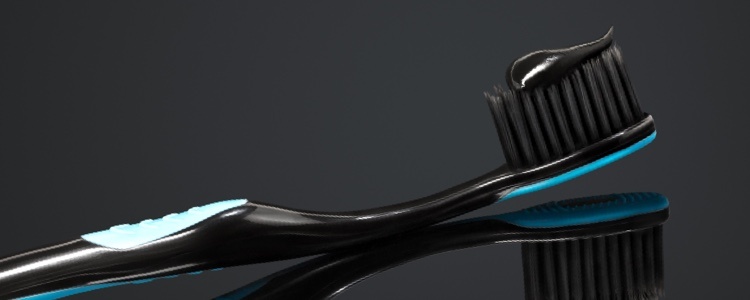In the Spotlight – Charcoal Toothpaste

Whilst huge improvements in dental care over recent decades mean that a great deal more people are now generally satisfied with the condition of their teeth, a huge number of individuals remain highly sensitive about the colour of their teeth. One fairly recent trend on the supermarket shelves is activated charcoal toothpaste, which often claims to be a superior solution for everyday stain removal and whitening. But what evidence is there to support these claims and, more importantly, is it really safe for your teeth? The Oral Health Foundation, a leading UK based dental charity, has recently asked these questions and others in a recent survey to help keep British dental patients safe.
Activated charcoal – what’s all the fuss about?
Activated charcoal is currently trending as one of the big new things, not just in toothpaste but also in a range of other daily beauty products including face scrubs, masks, soaps, deodorants and more. It can be found in the health food store as a dietary ‘remedy’ for many common problems, and is also found in a number of household cleaning products. But what is this mysterious wonder product and what exactly is all the fuss about?
The main difference between normal charcoal and activated charcoal is that in the activated form, the carbon is processed to give it small, low-volume pores that increase the surface area available for a process known as adsorption or other chemical reactions. It is this particular property that is claimed to give it its superior tooth cleaning qualities, as it theoretically allows the carbon to chemically bond with the particles causing staining and remove them. By making the surface area porous, it essentially acts as a super powerful sponge. When it comes to activated charcoal toothpaste, however, there is a lack of research to verify whether or not this effect is really happening, and what proportion of activated charcoal would be required for a cleaning reaction to take place
Why the massive popularity?
The simple answer to this question is marketing, rather than any real evidence that it is a revolutionary product with real results. Whether or not it really does leave you with whiter teeth, the product has received a great deal of celebrity endorsement which has helped to fuel a wave of popularity.
It is worth noting, however, that a significant amount of the interest in charcoal toothpaste is driven by influencer marketing by lesser celebrities on social media channels such as Instagram. With brands exploiting the desire of social media personalities to build their own exposure, there is a risk of unsubstantiated claims being made by influencers in return for financial and other incentives. Unlike TV and traditional advertising, it is much harder to monitor the claims of advertisers who use these modern channels.
Another problem with much of the advertising that has been seen is that it focuses on the supposed whitening benefits rather than the other more important features of toothpaste in maintaining good day-to-day oral hygiene, in particular protection from decay.
Can charcoal toothpaste damage my teeth?
Although there is no direct evidence to suggest that charcoal toothpaste is directly harmful to the teeth, there are some important factors to consider. Firstly, it is important to consider the role of fluoride in preventing tooth decay. Toothpaste needs to contain 1,350 to 1,500 parts per million (ppm) of fluoride in order to actively prevent decay. Many of the current toothpastes which contain activated charcoal, however, were found to fall well below this level and are consequently putting users at an increased risk of tooth decay by depriving them of this essential protection.
Abrasion is another key concern of the researchers, who state that “Some of the products may be over abrasive and if used too often can wear away the enamel on the teeth causing sensitivity.” There is a clear need for more research in this area.
If you do use or intend to use charcoal toothpaste, the advice is to ask your dentist for their advice to ensure that your product does not cause more harm than good. Ideally, choose a toothpaste that has been endorsed by one of the dental health bodies such as the British Dental Association (BDA).
What’s the best solution for whiter teeth?
For long term, satisfactory results that are proven to be safe for the teeth, it is recommended to speak to your dentist about professional teeth whitening. Whilst many toothpastes will tackle a limited amount of surface staining, their overall effectiveness is highly limited and they do not offer the long lasting bright white smiles which many users may be looking for, or are being promised though advertising.
The only truly safe and effective way to ensure that you get the results you really desire is to invest in professional whitening provided by your dentist and follow their advice in how to maintain your teeth.
Here at the award winning Bridge Dental and Implant Clinic in Derby, our team puts the safety, comfort and care of our patients above all else. We offer a choice of whitening options that are clinically proven to be safe and effective.To learn more about our teeth whitening services or make an appointment now, call us on 01332 916351 today or alternatively enquire online for a quick response.
This article is based on an original article published (October 18th 2017) by The Oral Health Foundation. Source: https://www.dentalhealth.org/.
Posted by Bridge Dental and Implant Clinic on 18th October 2017, under Teeth Whitening


